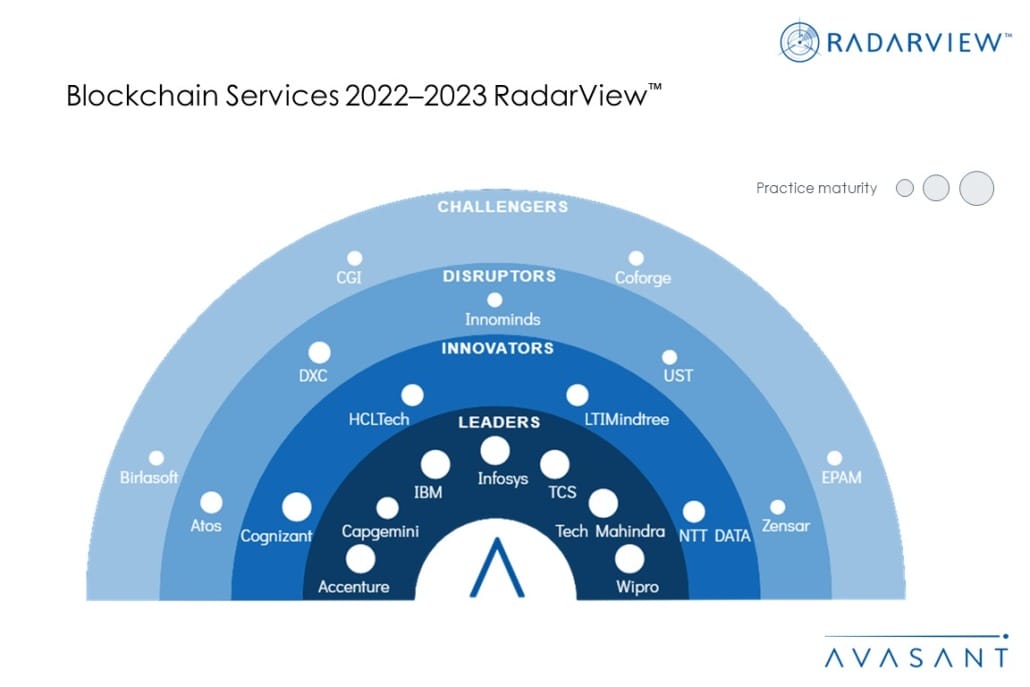After a slowdown during the pandemic, the adoption of blockchain services picked up the pace again in 2022. Use cases such as tokenization, CBDCs, NFTs, and the metaverse saw an increase in blockchain adoption, and new use cases emerged, such as blockchain for ESG. More enterprises are moving from POCs and pilots to full-scale production and building integrated digital solutions for blockchain with a focus on enabling trust and transparency and addressing data privacy issues. The share of enterprise production-grade projects increased from 18% in 2021 to 29% in 2022. These emerging trends, and others, are covered in Avasant’s Blockchain Services 2022 –2023 RadarView™.
The report gives organizations a view into key blockchain trends and developments shaping the market and helps them to identify the right service providers for adopting blockchain.
Avasant evaluated 38 providers using three dimensions: practice maturity, partner ecosystem, and investments and innovation. Of these, we recognized 20 who brought the most value to the market during the past 12 months.
The report recognizes service providers in four categories:
-
- Leaders: Accenture, Capgemini, IBM, Infosys, TCS, Tech Mahindra, and Wipro
- Innovators: Cognizant, HCL, LTIMindtree, and NTT DATA
- Disruptors: Atos, DXC, Innominds, UST, and Zensar
- Challengers: Birlasoft, CGI, Coforge, and EPAM
Figure 1 from the full report illustrates these categories:

“Companies are rekindling interest in blockchain as digital trust and transparency become key to achieving business objectives,” said Srinivas Vangala, Avasant fellow. “Blockchain, in conjunction with other digital technologies, such as AI and IoT, can make digital transformation more secure and efficient.”
The full report includes a number of recommendations, including the following:
- Adopt a two-pronged strategy for relevant impact from blockchain initiatives. As enterprises see their investment in blockchain as a discretionary spend necessary for innovation, they should adopt a two-pronged strategy for the short term and the long term to explore blockchain potential to create new business models.
- Leverage providers to resolve scalability, interoperability, and security challenges. Providers must develop easily deployable and scalable services with cloud infrastructure to reduce the initial cost of blockchain implementation and increase time to market.
- Develop integrated solutions to implement new and emerging use cases. To avoid the high cost of blockchain implementation and increase its adoption, companies are converging blockchain with the cloud and technologies such as AI, IoT, and AR/VR to develop new and emerging use cases and add security and transparency to their current core services.
- Participate in consortiums to accelerate their blockchain practice. Enterprises lack standardized rules and face legislative, governance, and investment issues when implementing a large-scale blockchain project. Participating in consortiums to share resources and expertise can help them save time and cost and mitigate risks for their blockchain projects.
“As new use cases emerge for blockchain, there is a greater need for scalability and interoperability and to achieve a positive ROI,” said Shwetank Saini, associate research director at Avasant. “As businesses try to overcome these challenges, partnering with service providers will foster co-creation and innovation that will accelerate blockchain adoption.”
The full report also features detailed RadarView profiles of 20 service providers, along with their solutions, offerings, case studies, and experience in assisting customers in blockchain initiatives.
This Research Byte is a brief overview of the Blockchain Services 2022– 2023 RadarView™ (click for pricing).


